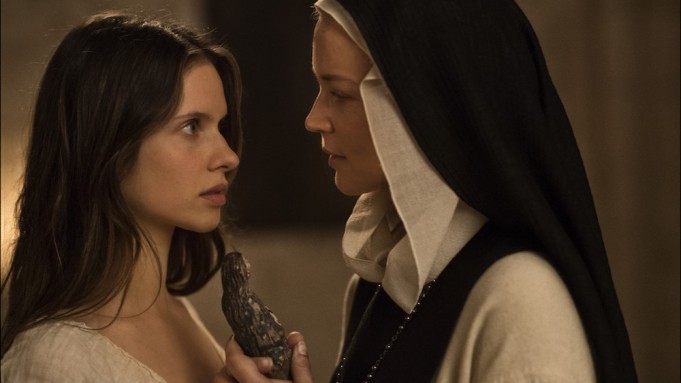By Mark Saldana
Rating: 3.5 (Out of 4 Stars)
Always an evocateur, Dutch filmmaker Paul Verhoeven takes on Catholicism in a film that empowers women and challenges its audience to think critically about the conventions that often prevent Christian religions from remaining relevant to the people they are supposed to serve. Verhoeven, who utilizes exploitation in his work, has made a powerful and artistic statement with his adaptation of the non-fiction book Immodest Acts: The Life of a Lesbian Nun in Renaissance Italy by Judith C. Brown. Though his film doesn’t completely work as a defiant commentary on organized religion, it still delivers some indelible blows with much passion and courage.
In 17th century Tuscany, Italian nun Benedetta Carlini (Virginie Efira) is passionately inspired to deliver the will of God and Jesus through her work and examples in her abbey. Through dreams and visions Bendetta believes she is destined to become the wife of Jesus, but also has strong feelings of attraction and lust toward Bartolomea (Daphne Patakia), a disheveled peasant taken in by the convent who also aspires to become a servant of God. What follows is a power struggle within the nuns of the convent and the Catholic church. However, Benedetta remains undaunted and passionate about her goals, despite her natural inclinations which are eventually recognized and witnessed by those who oppose her.
Verhoeven, who co-wrote the screenplay with David Birke, has made a provocative film with Bendetta. The film, which screened at this year’s Fantastic Fest as the second secret screening, was introduced Tim League of the Alamo Drafthouse. In his introduction, League jokingly stated that the festival is screening a faith-based film. However, I feel that Verhoeven is definitely serious about his faith-inspired story that, while it does critique religious conventions, it never completely diminishes the power of said faith. While the character of Benedetta does challenge Catholic hypocrisy, she never once gives any indication that she does not believe in the divine work she hopes to accomplish.
My only issues with the movie have to do with the more explicit, sexual content that often comes across as exploitation. While Verhoeven often utilizes shock and eroticism welll, he sometimes crosses a line that makes his overall messages feel tainted by his indulgences. Nevertheless, Benedetta is truly a remarkable film that is sure to arouse much conversation by audiences, as all good art should.
The movie features some bold and dynamic performances by the cast, particularly that of Virginie Efira who portrays the titular character of Benedetta. As Bartolomea, Daphne Patakia also gives a tremendous turn as Bendetta’s love interest and staunchest supporter. Charlotte Rampling, who is known for her daring and incredible acting career, is perfectly cast as Benedetta’s Abbess.
In the end, Benedetta is another movie that delivers a commentary about power and what women have gone through to attain such power in a world dominated by men. Using shock and awe, Verhoeven goes deeper and more fearless than he ever has prior to this film. It is a movie that is sure to upset many, but will also intrigue, tantalize, and marvel just as many.
